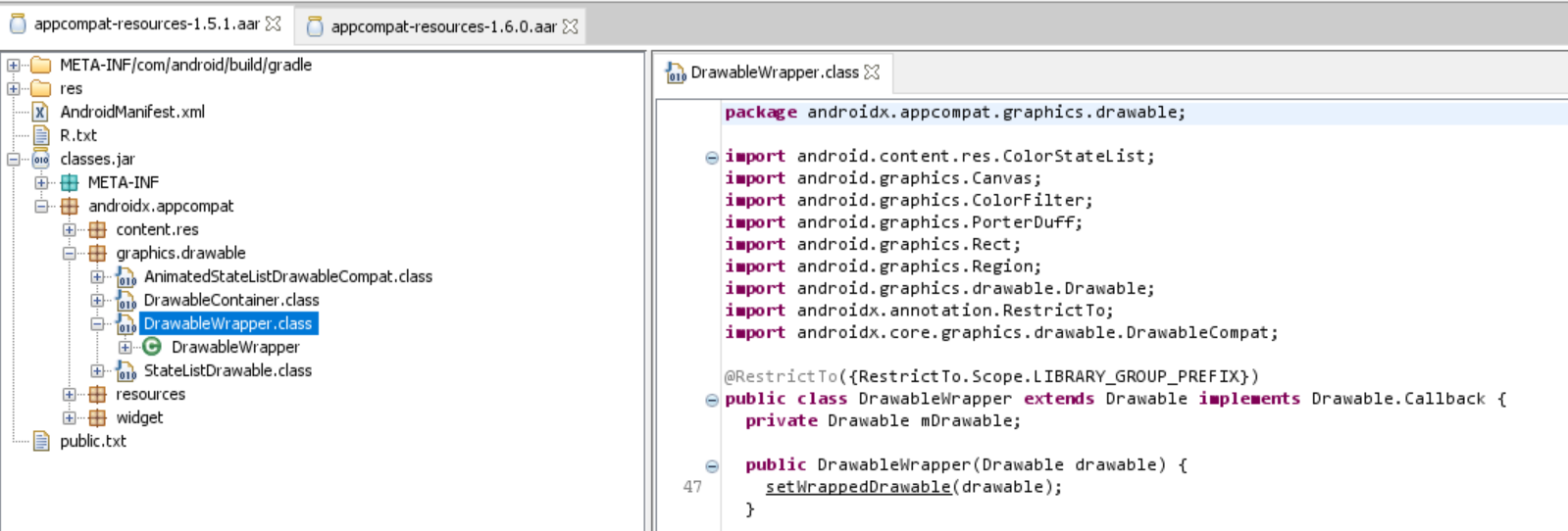-
Notifications
You must be signed in to change notification settings - Fork 53
New issue
Have a question about this project? Sign up for a free GitHub account to open an issue and contact its maintainers and the community.
By clicking “Sign up for GitHub”, you agree to our terms of service and privacy statement. We’ll occasionally send you account related emails.
Already on GitHub? Sign in to your account
[generator] Add support for @RestrictTo.
#1094
Conversation
| var annotations = attributes?.OfType<RuntimeInvisibleAnnotationsAttribute> ().FirstOrDefault ()?.Annotations; | ||
|
|
||
| if (annotations?.FirstOrDefault (a => a.Type == "Landroidx/annotation/RestrictTo;") is Annotation annotation) | ||
| return new XAttribute ("annotated-visibility", ((annotation.Values.FirstOrDefault ().Value as AnnotationElementArray)?.Values?.FirstOrDefault () as AnnotationElementEnum)?.ConstantName ?? string.Empty); |
There was a problem hiding this comment.
Choose a reason for hiding this comment
The reason will be displayed to describe this comment to others. Learn more.
RestrictTo.getValue() returns an array of RestrictTo.Scope values; why pick just the first value instead of printing a -separated sequence of all of them?
There was a problem hiding this comment.
Choose a reason for hiding this comment
The reason will be displayed to describe this comment to others. Learn more.
I don't think I realized it was an array. By the time I figured out that monstrosity of code needed to get a value I thought I had the only value. 😁
|
Draft commit message: generator] Add support for @RestrictTo (#1094)
Fixes: https://github.com/xamarin/java.interop/issues/1081
Context: https://github.com/xamarin/AndroidX/issues/690
AndroidX has a [`@RestrictTo` annotation][0] that essentially means
"this API is implemented as `public`, but we do not consider it to be
supported API". (It can be considered as the equivalent of
[C# `internal` visibility][1] or of [.NET preview features][2].)
This means that Google reserves the right to change such types at any
time -- and they have! -- which can in turn break our apps.
Because we simply bound the API as `public`, it misled our users
into believing that this is a stable API they can rely on.
For example, consider xamarin/AndroidX#690, in which
[`androidx.appcompat.appcomat-resources`][3] "broke" API between
[version 1.5.1][4] and [version 1.6.0][5], because Google
[decided to promote classes][6] which had been
`@RestrictTo({RestrictTo.Scope.LIBRARY_GROUP_PREFIX})` in
version 1.5.1 to become "real" `public` types, and in the process
*renamed* those types, e.g. `DrawableWrapper` became
`DrawableWrapperCompat`. This renaming broke some of our customers.
Version 1.5.1:

@RestrictTo(RestrictTo.Scope.LIBRARY_GROUP_PREFIX)
public class DrawableWrapper extends Drawable …
Version 1.6.0:

public class DrawableWrapperCompat extends Drawable …
The root problem is that we were binding `@RestrictTo` types which
never should have been bound. Fixing this involves two steps:
(1) detection, and (2) mitigation.
Update `class-parse` so that the `@RestrictTo` annotation is now
supported. If the `@RestrictTo` annotation is present, then a new
`//*/@annotated-visibility` attribute within `api.xml` will contain
the [`RestrictTo.Scope` values][7]
<class
name='DrawableWrapper'
…
annotated-visibility='LIBRARY_GROUP_PREFIX'
/>
Update `Xamarin.Android.Tools.ApiXmlAdjuster.dll` so that the new
`annotated-visibility` is supported and "passed through".
These changes allow `generator` to know that `@RestrictTo` was used
and what it was applied to, which brings us to mitigation:
We can't *not* continue binding these types; removing these types
would be an API break.
Instead, *for now*, we will add an `[Obsolete]` attribute to the
affected API with a message describing the situation:
[Obsolete (
"While this type is 'public', Google considers it internal API and reserves the right to modify or delete it in the future. Use at your own risk.",
DiagnosticId = "XAOBS001")[]
public partial class DrawableWrapper {
}
This uses a custom warning code XAOBS001, which allows users to use
`$(NoWarn)` to ignore these warnings, if necessary.
Additionally, this new "`[Obsolete]` on `@RestrictTo` types" behavior
is *off by default*, and only enabled via the new
`generator --lang-features=restrict-to-attributes` option.
Note that only one `[Obsolete]` is allowed on each type/member, so if
the API already has an `[Obsolete]` attribute, e.g. because it is
`@Deprecated`, then the XAOBS001 obsolete message will be skipped.
TODO: Enable `generator --lang-features=restrict-to-attributes` in
.NET Android Binding Projects, with an MSBuild property to disable
this option if necessary.
TODO: *Eventually* we'll also need a way to *not* bind these types.
[0]: https://developer.android.com/reference/androidx/annotation/RestrictTo
[1]: https://learn.microsoft.com/dotnet/csharp/language-reference/keywords/internal
[2]: https://github.com/dotnet/designs/blob/7d0be161bfb55117543f2833b645e089b646f8ab/accepted/2021/preview-features/preview-features.md
[3]: https://maven.google.com/web/index.html?q=androidx.appcompat#androidx.appcompat:appcompat-resources
[4]: https://dl.google.com/android/maven2/androidx/appcompat/appcompat-resources/1.5.1/appcompat-resources-1.5.1.aar
[5]: https://dl.google.com/android/maven2/androidx/appcompat/appcompat-resources/1.6.0/appcompat-resources-1.6.0.aar
[6]: https://android-review.googlesource.com/c/platform/frameworks/support/+/2120177
[7]: https://developer.android.com/reference/androidx/annotation/RestrictTo.Scope |
Fixes: #1081
Android has an annotation
androidx.annotation.RestrictTo(@RestrictTo) that essentially means "this API is implemented aspublic, but we do not consider it public API". This means that Google reserves the right to change it at any time (see dotnet/android-libraries#690). Because we simply bind the API aspublic, it misleads our users into thinking this is a stable API they can rely on.Example
In
androidx.appcompat.appcompat-resources1.6.0, Google decided to promote classes that were previously marked as@RestrictTo({RestrictTo.Scope.LIBRARY_GROUP_PREFIX})to full public supported classes. However, when they did this they changed the names of the classes, breaking our users (including XF) who were using the "internal" classes.1.5.1
1.6.0
Support
We are going to support this by adding a new
[Obsolete]attribute on the affected API with a message describing the situation. We will use the new ability inObsoleteAttributeto provide a custom warning code. This will allow users to<NoWarn>the code if they wish to ignore all of these types of warnings.Changes
To accomplish this, the following changes were needed:
class-parseto look for the@RestrictToannotation, and output its value as anannotated-visibilityinapi.xml.xml-adjusterto support and pass through theannotated-visibilityattribute.generatorto add the appropriate[Obsolete]attribute when needed.Note that only one
[Obsolete]attribute is allowed per type/member, so if the API already has a regular[Obsolete]attribute, we do not add the@RestrictToinformation.The
generatorchanges are gated behind--lang-features=restrict-to-attributes. It is off by default. I propose we turn it on by default using MSBuild, but provide an opt-out MSBuild property in case a user wishes to opt out.